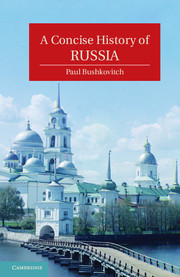Book contents
- Frontmatter
- Contents
- List of Figures
- Abbreviations
- Acknowledgments
- Prologue
- 1 Russia before Russia
- 2 Moscow, Novgorod, Lithuania, and the Mongols
- 3 The Emergence of Russia
- 4 Consolidation and Revolt
- 5 Peter the Great
- 6 Two Empresses
- 7 Catherine the Great
- 8 Russia in the Age of Revolution
- 9 The Pinnacle of Autocracy
- 10 Culture and Autocracy
- 11 The Era of the Great Reforms
- 12 From Serfdom to Nascent Capitalism
- 13 The Golden Age of Russian Culture
- 14 Russia as an Empire
- 15 Autocracy in Decline
- 16 War and Revolution
- 17 Compromise and Preparation
- 18 Revolutions in Russian Culture
- 19 Building Utopia
- 20 War
- 21 Growth, Consolidation, and Stagnation
- 22 Soviet Culture
- 23 The Cold War
- Epilogue
- Further Reading
- Index
11 - The Era of the Great Reforms
Published online by Cambridge University Press: 05 June 2012
- Frontmatter
- Contents
- List of Figures
- Abbreviations
- Acknowledgments
- Prologue
- 1 Russia before Russia
- 2 Moscow, Novgorod, Lithuania, and the Mongols
- 3 The Emergence of Russia
- 4 Consolidation and Revolt
- 5 Peter the Great
- 6 Two Empresses
- 7 Catherine the Great
- 8 Russia in the Age of Revolution
- 9 The Pinnacle of Autocracy
- 10 Culture and Autocracy
- 11 The Era of the Great Reforms
- 12 From Serfdom to Nascent Capitalism
- 13 The Golden Age of Russian Culture
- 14 Russia as an Empire
- 15 Autocracy in Decline
- 16 War and Revolution
- 17 Compromise and Preparation
- 18 Revolutions in Russian Culture
- 19 Building Utopia
- 20 War
- 21 Growth, Consolidation, and Stagnation
- 22 Soviet Culture
- 23 The Cold War
- Epilogue
- Further Reading
- Index
Summary
Russia's defeat in the Crimean War caused a tremendous political shock in the country. It was not the scale of the defeat but its revelation of the weakness of a political system that prized its unique conservatism on the European scene and its supposed military might above all. It was the autocracy that was defeated, all the more so because the long siege of Sevastopol demonstrated to many Russians that the army still had the spirit to fight, a spirit hampered by the backwardness of society and government. Russia's backwardness was not only the result of the slow evolution of economy and society under the tutelage of Tsar Nicholas. The greatest problem was that the world was changing very quickly in the middle years of the nineteenth century, and the most rapid changes were taking place in Great Britain, Russia's primary imperial rival. Railroads were transforming the landscape in all of Western Europe and the United States, building on and stimulating the rapid modernization of iron and steel production, thereby raising output to new heights. Besides railroads, all sorts of machines came into existence – improved steam engines, telegraph equipment, and huge metal-hulled ships. Britain and other powers imported increasing amounts of food and raw materials from colonies and distant countries in the Western hemisphere, sending out masses of cotton and wool cloth, machinery, and innumerable consumer goods. Society evolved to support all this growth, with high-speed presses to produce daily newspapers and rapidly expanding educational systems to produce engineers, lawyers, politicians, and an educated public to use the new products. In this new world, Russia was lagging behind. The reformers in the government realized all this and saw that Russia needed the new production techniques and a new economy simply to survive as a major power. They also realized that technology alone was not enough: Tsar Nicholas had built railroads, but had not succeeded in transforming the Russian economy. Russia would need a new legal system, a modernized and expanded educational system, and even some forms of public discussion of major issues. What Russia could not stand, the reformers believed, was a new political system. Most of them admired the emerging constitutional regimes in Europe, but believed that Russia was far too primitive with its illiterate peasantry, outmoded agriculture, and thin layer of educated people. Such a society could not sustain a free, constitutional government. For the foreseeable future, it would have to remain an autocracy.
- Type
- Chapter
- Information
- A Concise History of Russia , pp. 186 - 207Publisher: Cambridge University PressPrint publication year: 2011

